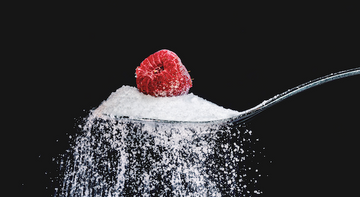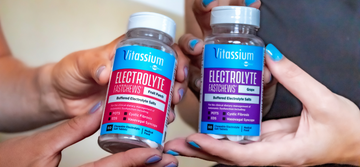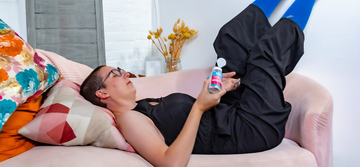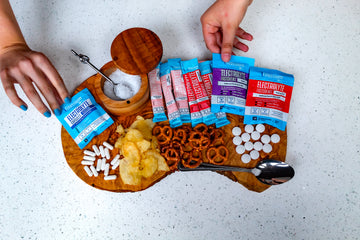
Often, sports drinks are recommended to people living with Postural Orthostatic Tachycardia Syndrome (POTS), but are they really the best choice?
While sports drinks can be a helpful tool in consuming large amounts of water and electrolytes to help manage symptoms, they are also often loaded with processed and refined sugar and artificial food dyes. (See chart below for added sugar content.)
According to the Centers for Disease Control and Prevention (CDC), added sugars contribute calories to one’s diet, but no essential nutrients, and too much added sugar consumption can lead to health problems such as weight gain and obesity, type 2 diabetes, and heart disease.
Ratio of Sodium to Added Sugar in Sports Drinks
Let’s break it down, using data derived from the nutritional information of a common sports drink:
- An intake of 3,000 mg to 10,000 mg of sodium per day is typically recommended for the management of POTS symptoms. (Source: Cleveland Clinic)
- The New 2020-2025 Dietary Guidelines for Americans recommends that Americans over 2 years old limit their daily intake of added sugar* to less than 10% of total calories, which amounts to 50 grams of added sugar per day for a 2,000 calorie diet. (Source: CDC)
- A typical twelve-ounce drink contains 160 mg of sodium and 21 grams of added sugar. If POTS patients were to get their daily intake of sodium from sports drinks, they would also be consuming from over 7 times up to over 26 times the recommended upper limit for added sugar.

Numbers sourced from: https://www.gatorade.com/fuel/hydration/gatorade-thirst-quencher/bottle/fierce-blue-cherry
Another thing to consider is that when it comes to POTS, symptoms can worsen after meals rich in carbohydrates, according to research from Vanderbilt University Medical Center. Dysautonomia International advises that if patients notice a worsening of symptoms after eating, they may want to try consuming fewer simple carbohydrates (like refined sugars and flours).
The bottom line: Though sports drinks may contain the sodium needed to help manage symptoms of POTS, the added sugars could have a negative effect for some people.
Alternative Options
The good news is that people with POTS have other ways to consume electrolytes to help manage symptoms – without the added sugars.
For instance, as a medical food, Vitassium provides a scientific formulation of sodium and potassium that was created specifically to help meet the needs of people living with POTS. Each two-capsule serving delivers 500 mg of sodium without added sugar or preservatives. Vitassium is also now available in delicious chewable tablets that provide 125 mg per serving and are non-GMO, vegan, gluten free, and allergen free.
Learn more about Vitassium here. And if you or a loved one rely on Vitassium for health reasons, consider joining the Vitassium Club to access discounts and free shipping.
+++
*Added sugars are sugars and syrups that are added to foods or beverages when they are processed or prepared. Naturally occurring sugars such as those in fruit or milk are not added sugars.
Added sugars have many different names. Examples of added sugars include brown sugar, cane juice, corn syrup, dextrose, fructose, fruit nectars, glucose, high-fructose corn syrup, honey, lactose, malt syrup, maltose, maple syrup, molasses, raw sugar, and sucrose.
+++
Disclaimer: Contact your physician before starting any exercise program or if you are taking any medication. Individuals with high blood pressure should also consult their physician prior to taking an electrolyte supplement. Overdose of electrolytes is possible, with symptoms such as vomiting and feeling ill, and care should be taken not to overdose on any electrolyte supplement.







